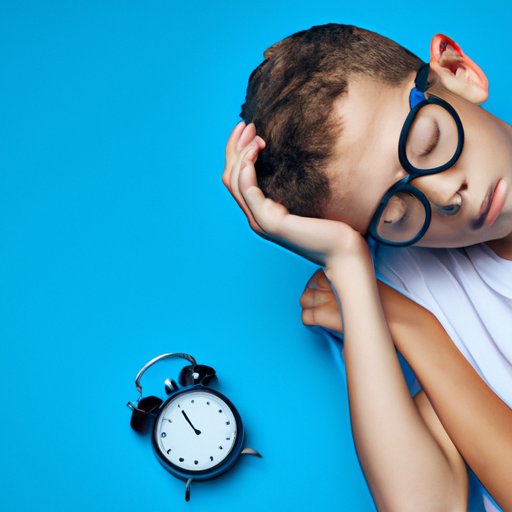Introduction
Adolescence is a critical period for learning and growth. During this time, teenagers must juggle a variety of activities such as school, extracurriculars, and social events. In order to stay healthy and alert, it is essential that they get enough sleep. But how much sleep does the average teenager need? This article will explore this question and examine the impact of sleep deprivation on teenagers’ physical and mental health, as well as their academic success.

A Study of the Sleep Habits of Teenagers
In order to understand the amount of sleep required by teenagers, it is important to look at the existing research on the subject. One study conducted by the National Sleep Foundation surveyed over 1,600 adolescents in the United States between the ages of 13 and 18. The study found that the average amount of sleep for teenagers in this age range was 7.4 hours per night.
The study also revealed interesting differences between males and females. Female respondents reported sleeping an average of 7.3 hours per night, while male respondents reported sleeping an average of 7.6 hours per night.
The survey also asked respondents about factors that may have affected their sleep. The most commonly cited factor was stress, with nearly half of all respondents reporting feeling stressed during the week prior to taking the survey. Other factors included homework, digital devices, and parental expectations.
The Effects of Sleep Deprivation in Teens
Sleep deprivation can have serious consequences for teenagers. Not getting enough sleep can lead to physical, mental, and emotional issues.
Physically, teens who don’t get enough sleep are more likely to suffer from headaches, increased susceptibility to illness, and impaired coordination. They are also at greater risk for developing chronic conditions such as obesity, diabetes, and heart disease.
Mentally, sleep deprivation can lead to difficulty concentrating, irritability, depression, and anxiety. Teens who are sleep deprived are also more likely to engage in risky behaviors such as substance abuse, driving under the influence, and sexual activity.
Emotionally, sleep deprivation can cause teens to become more prone to anger, sadness, and mood swings. It can also lead to feelings of isolation and loneliness.
Examining the Role of Technology in Teenagers’ Sleep Patterns
Technology plays an important role in teenagers’ lives. Unfortunately, it can also be a major contributor to sleep deprivation. Studies have shown that teens who spend a lot of time on digital devices and engaging in online activities tend to get less sleep than those who do not.
Screen time has been linked to decreased sleep quality and quantity. One study found that teens who spent more than four hours per day on screens were more likely to be sleep deprived than those who spent less than two hours per day on screens. Additionally, teens who used digital devices within an hour of going to bed were more likely to experience disrupted sleep.
Digital devices can also disrupt the body’s natural sleep-wake cycle. The blue light emitted by these devices can interfere with melatonin production, making it harder for teens to fall asleep and stay asleep.

Exploring the Correlation between Academic Success and Adequate Sleep in Teenagers
Getting enough sleep is essential for academic success. Studies have shown that teens who get adequate sleep are more likely to perform better in school. Sleep helps the brain process and retain information, which is important for learning.
Poor sleep can have a negative impact on grades. Teens who are sleep deprived are more likely to struggle in school and have lower grades. They are also more likely to miss classes and have difficulty focusing in class.

Investigating Parental Expectations and the Impact on Teenage Sleep Habits
Parental expectations can have a significant impact on teenage sleep habits. Parents who place high expectations on their children can contribute to stress and anxiety, which can lead to poor sleep.
Parents can play an important role in helping their children establish healthy sleep habits. They can set limits on screen time and encourage their children to get enough rest.
Conclusion
This article has explored the amount of sleep that the average teenager needs and the potential consequences of sleep deprivation. It has also examined the role of technology and parental expectations in teenage sleep habits.
The findings suggest that teenagers should aim to get at least seven hours of sleep per night in order to stay healthy and alert. Additionally, parents should set limits on screen time and help their children establish healthy sleep habits.
(Note: Is this article not meeting your expectations? Do you have knowledge or insights to share? Unlock new opportunities and expand your reach by joining our authors team. Click Registration to join us and share your expertise with our readers.)
